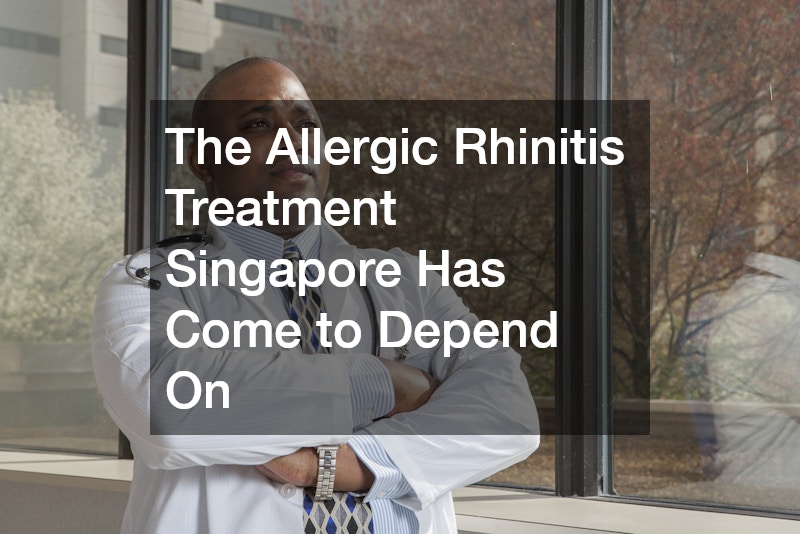The Allergic Rhinitis Treatment Singapore Has Come to Depend On
Allergic rhinitis is a condition that affects a significant portion of the population in Singapore, causing symptoms such as sneezing, a runny nose, nasal congestion, and itchy eyes. With Singapore’s humid climate and high pollen levels, many residents suffer from these persistent symptoms, especially during certain seasons. Fortunately, several options for allergic rhinitis treatment Singapore residents have come to trust are widely available, offering relief to those affected. Whether triggered by dust mites, pollen, or other allergens, there are effective treatment options that can help manage the condition and improve overall quality of life.
The allergic rhinitis treatment Singapore depends on is designed to target the underlying causes of the condition, not just its symptoms. ENT specialists in Singapore take a comprehensive approach to diagnosing and treating allergic rhinitis, ensuring that patients receive personalized care. This means that the treatment plan is tailored to the specific allergens and severity of the symptoms each individual experiences. By addressing the root cause, patients can enjoy long-term relief rather than relying on short-term fixes that only offer temporary respite.
One of the most common treatments for allergic rhinitis is medication. Antihistamines, nasal sprays, and decongestants are frequently prescribed to help alleviate symptoms and prevent them from interfering with daily life. The allergic rhinitis treatments offered include a range of over-the-counter and prescription medications, depending on the severity of the condition. For those with mild to moderate symptoms, antihistamines and corticosteroid nasal sprays are often effective in reducing inflammation and controlling sneezing and congestion. The right medication can help sufferers regain control of their lives, even during allergy flare-ups.
For those experiencing more severe or persistent symptoms, immunotherapy is another option available in allergic rhinitis treatment Singapore trusts. Immunotherapy works by gradually desensitizing the immune system to specific allergens through controlled exposure over time. This treatment can take the form of allergy shots or sublingual tablets, both of which are effective in reducing sensitivity to allergens. Many patients find that after completing a course of immunotherapy, their symptoms are significantly reduced or even eliminated. It’s a long-term solution that addresses the cause of allergic rhinitis at its core, offering hope for lasting relief.
Lifestyle adjustments can also play a critical role in managing allergic rhinitis. Simple changes, such as keeping windows closed during high pollen seasons, using air purifiers, and regularly cleaning household surfaces to reduce dust mites, can help minimize exposure to allergens. The allergic rhinitis treatment Singapore patients rely on often includes guidance on how to make these small but impactful adjustments to everyday routines. These changes not only reduce the frequency and severity of allergic reactions but also create a healthier living environment for the whole family.
In some cases, surgical intervention may be recommended as part of the allergic rhinitis treatment Singapore trusts, especially if structural issues in the nasal passages are contributing to the condition. For individuals who have nasal polyps or a deviated septum, surgery can provide significant relief by improving airflow and reducing nasal congestion. While surgery is not the first line of treatment, it is an option for those who have not responded well to medications or other therapies. ENT specialists work closely with patients to determine the best course of action based on their unique circumstances.
For children suffering from allergic rhinitis, specialized care is essential to ensure that their symptoms are managed effectively. Pediatric options for the allergic rhinitis treatment Singapore appreciates often focus on gentle, child-friendly approaches that minimize discomfort while providing relief. Treatment plans for children often involve milder medications and non-invasive therapies, such as saline nasal sprays, to help clear nasal passages and reduce symptoms. By managing the condition early, children can avoid the long-term complications that can arise from untreated allergic rhinitis, such as chronic sinus infections and asthma.
Preventing allergic rhinitis from affecting daily life requires ongoing management and regular check-ups with an ENT specialist. The allergic rhinitis treatment Singapore relies on often includes follow-up appointments to monitor progress and adjust treatment plans as needed. For those with seasonal allergies, this can be particularly important, as symptoms may worsen during certain times of the year. By staying proactive and working closely with healthcare providers, patients can enjoy a better quality of life and keep their symptoms under control.
In conclusion, the allergic rhinitis treatment Singapore has come to depend on offers a variety of solutions for managing this common condition. Whether through medications, immunotherapy, lifestyle changes, or surgical options, patients have access to a comprehensive range of treatments that can provide lasting relief. With the support of skilled ENT specialists, those suffering from allergic rhinitis can take control of their symptoms and enjoy a higher quality of life. From children to adults, the right care ensures that allergic rhinitis no longer has to be a burden on daily living.
.

